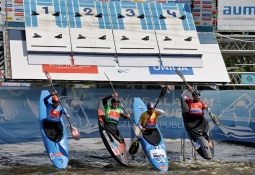The signs are good for the continued growth of Paracanoe around the world, the board meeting of the International Canoe Federation has been told in Tokyo.
Paracanoe made its Paralympics debut in Rio in 2016, and will have an additional three events in Tokyo in 2020.
“This is a great vote of confidence in our sport,” John Edwards, head of the ICF’s Paracanoe Committee, said.
“Only four sports received new medal events and additional athlete quota for Tokyo, and we were one of them. We have also been given an extra day of competition, so we will be three days instead of two.
“Hopefully, we will be given at least one day on a weekend, because that drives up interest and crowd numbers.”
Paracanoe will have nine medal events and 90 athlete slots in Tokyo. Mr Edwards said double entries will also be allowed, meaning athletes who qualify for one discipline will also be able to compete in a different category if they fit the classification criteria.
The new medals will be allocated to the category of Va’a, a discipline using a form of outrigger canoe which is particularly popular in Pacific Island countries.
Mr Edwards said the International Va’a Federation would be hosting their 2018 world championships with Paracanoe events in Tahiti, with the ICF Classifiers attending.
“If we can expand the recognition of Paracanoe world-wide, more people will watch and become involved,” Mr Edwards said.
“We have to be at a point where major sporting events come to us, asking us to be involved in their Games, rather than us trying to become part of their program.
“We have a huge opportunity to make this work.”
Mr Edwards said there were ten national federations that took part in the most recent Asian Paracanoe Championships, and it was hoped that number would continue to grow.
He highlighted the Pan Am Games, emphasising Paracanoe needed to be part of ten countries in that region to have any chance of being part of the event.
He also said it was preferable in the future not to conduct any continental Paracanoe championships as stand-alone events, as the costs were quite high.
Mr Edwards said Paracanoe would next look at incorporating a category for athletes with upper limb impairments.
But he warned it would not happen overnight.
“We’re looking at how we can develop this as a category,” he said.
“It would take six to eight years for inclusion as part of the Paralympic Games.
“After that, we could look at athletes with neurology impairments, like cerebral palsy. National Federations are able to initiate other impairment categories at their level in response to their internal national requirements.
“We are changing the DNA of canoeing by our efforts to include paddlers with impairments in our sport.”




